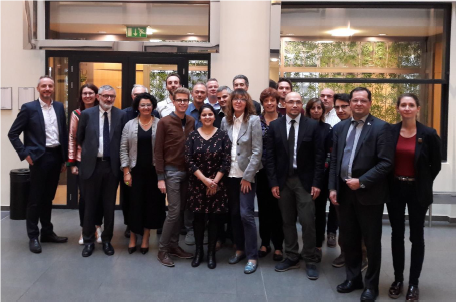The INCITE project has officially been launched. This 4-year project, coordinated by Oleon and primarily funded through the EU’s Horizon 2020 programme, seeks to bring about a transition to a more flexible and sustainable chemistry. It does so by building on technology developed in the context of Catalisti’s Lipametics project.

On 17 October 2019, the INCITE project was kicked-off in Brussels. This ambitious multi-stakeholder project, formally titled Innovative Chemoenzymatic Integrated Processes, brings together European partners in a cross-border consortium: three universities and research organisations (VITO, Belgium; Fraunhofer Gesellschaft, Germany; and University of Ghent, Belgium), two SMEs (BICT, Italy; and Bio-P, Italy), two large industrial players (Oleon, Belgium; and Endura, Italy) and an innovation cluster (IAR, the French bioeconomy cluster).
The goal of the INCITE project is to prove at an industrial scale that chemoenzymatic processes have clear environmental gains, are cost-effective and can contribute to increase safety in the work environment. It does so by building on technology developed within the framework of Catalisti’s Lipametics project. The project will base its demonstration on two chemoenzymatic processes using hydrolases, one being the esterase-catalysed of an important precursor in the production of insecticides, and the other being the solvent-free synthesis of oleochemical esters using lipase enzymes. The target products include commodities and fine chiral chemicals for crop protection, agrochemicals, public health, feed/food and cosmetics.
In the course of the project, processes will be demonstrated in real industrial settings and both cases should have clear advantages of greater efficiency, higher product quality, higher safety and a smaller environmental footprint. The project estimates reaching a minimum of 20% decrease in greenhouse gas emissions and a minimum of 40% resource and energy efficiency gains compared to traditional chemical synthesis and will demonstrate this assumption using state of the art Life Cycle Assessment methods.
The project will run for 4 years and has a budget of 17 million EUR, roughly 80% of which is financed by the EU under the umbrella of the Horizon 2020 research and innovation programme.
This piece is based on a press release published on 29/10/2019 by IAR, the French bioeconomy cluster. For more information about the INCITE project, please visit www.cordis.europa.eu/project/id/870023 and www.vito.be/en/news/incite-project-kick.
The goal of the INCITE project is to prove at an industrial scale that chemoenzymatic processes have clear environmental gains, are cost-effective and can contribute to increase safety in the work environment. It does so by building on technology developed within the framework of Catalisti’s Lipametics project. The project will base its demonstration on two chemoenzymatic processes using hydrolases, one being the esterase-catalysed of an important precursor in the production of insecticides, and the other being the solvent-free synthesis of oleochemical esters using lipase enzymes. The target products include commodities and fine chiral chemicals for crop protection, agrochemicals, public health, feed/food and cosmetics.
Once demonstrated, these processes will have a significant potential for increasing product quality while reducing both costs and environmental footprint, with a more targeted production at lower temperatures and fewer and less hazardous effluents than in currently utilized conventional chemical synthesis processes” – dr. Yann Raoul, project coordinator at Oleon
In the course of the project, processes will be demonstrated in real industrial settings and both cases should have clear advantages of greater efficiency, higher product quality, higher safety and a smaller environmental footprint. The project estimates reaching a minimum of 20% decrease in greenhouse gas emissions and a minimum of 40% resource and energy efficiency gains compared to traditional chemical synthesis and will demonstrate this assumption using state of the art Life Cycle Assessment methods.
The project will run for 4 years and has a budget of 17 million EUR, roughly 80% of which is financed by the EU under the umbrella of the Horizon 2020 research and innovation programme.
This piece is based on a press release published on 29/10/2019 by IAR, the French bioeconomy cluster. For more information about the INCITE project, please visit www.cordis.europa.eu/project/id/870023 and www.vito.be/en/news/incite-project-kick.
